About the general area
Jesuit settler Father Dablon, superior of the missions of the Upper Algonkin in 1670, made note of the importance of the area with respect to the many tribes of the aboriginal Ottawa peoples who inhabited the region.
Originally, the area prospered as a logging settlement, but in the years since 1982, when the last of the log drives occurred, ecotourism [2] and white water rafting [3] have become the prominent attractions for travelers here. Adventure guides from Esprit Lodge lead tours of the region including the Coulonge Chutes and along the Cycloparc PPJ, a major eastern Canadian hiking and bicycle trail.
The area is rich in history with respect to the French settlement of Canada and was written about and explored by early Jesuit missionaries who noted the tradition and heritage of canoeing via the Ottawa River.
"Father Le Mercier (Jes. Rel. 1654), speaking of a flotilla of canoes from the "upper nations," says that they were "partly Ondataouaouat, of the Algonquine language, whom we call les Cheueux Releuez." And in the Relation for 1665 the same Father says of the Ottawa that they were better merchants than warriors."
Esprit Rafting was selected as the 'second best outfitter on Earth' by National Geographic Adventure magazine.
History
Esprit Rafting launched in 1992, having received a loan from Société d'aide au développement des collectivités (S.A.D.C.) as part of a regional effort to promote economic development in Canadian rural areas through business loans. [5] Since that time, Esprit has become internationally known for adventure travel expeditions throughout the Ottawa River system, Chile, Costa Rica and other destinations.
The proprietors of Esprit Lodge operate several micro-philanthropy ventures in Jalcomulco, Mexico, concentrating on promoting the core values of ecotourism. Locally, the Hermanos project has resulted in the establishment of the first community Internet café, a photo business, a rafting company along with Esprit's winter operation employing local adventure guides and a museum.
Esprit Lodge has hosted numerous significant adventure races, including one of the first Raid the North adventure races in 1999, the Canadian Adventure Racing Championship in 2005, and many other events in partnership with Frontier Adventure Sports, Canada's leading adventure race provider.
On May 20, 2016 a fire broke out inside the lodge resulting in the building being completely destroyed. [6] Esprit continues to operate on the property, delivering whitewater tours as well as offering camping and cabin accommodations on the property.

Rafting and whitewater rafting are recreational outdoor activities which use an inflatable raft to navigate a river or other body of water. This is often done on whitewater or different degrees of rough water. Dealing with risk is often a part of the experience.

Whitewater kayaking is an adventure sport where a river is navigated in a decked kayak. Whitewater kayaking includes several styles. River running; where the paddler follows a river and paddles rapids as they travel. Creeking usually involving smaller, steeper, and more technical waterways. Creek boats tend to be short but high volume to allow for manoeuvrability while maintaining buoyancy. Slalom requires paddlers to navigate through "gates". Slalom is the only whitewater event to be in the Olympics. Play boating involves staying on one feature of the river and is more artistic than the others. Squirt boating uses low-volume boats to perform special moves in whitewater features.

The Lachine Rapids are a series of rapids on the Saint Lawrence River, between the Island of Montreal and the South Shore. They are located near the former city of Lachine. The Lachine Rapids contain large standing waves because the water volume and current do not change with respect to the permanent features in the riverbed, namely its shelf-like drops. Seasonal variation in the water flow does not change the position of the waves, although it does change their size and shape. The rapids are about 4.8 kilometres (3.0 mi) in length. In the past these represented a considerable barrier to maritime traffic. Until the construction of the Lachine Canal through Montreal, the rapids had to be portaged. Even with the canal, the difficulty was such that it was usually more convenient to ship goods by rail to Montreal, where they could be loaded at the city's port. Montreal remains a major rail hub and one of Canada's largest ports for that reason.
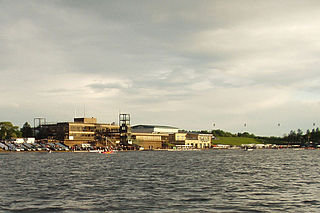
Holme Pierrepont Country Park, home of The National Water Sports Centre is located in the hamlet of Holme Pierrepont near Nottingham, England and on the River Trent. It is used for many differen sports and has received investment which has enabled a major refurbishment of existing facilities as well as introduction of new facilities.

Canoe freestyle is a discipline of whitewater kayaking or canoeing where people perform various technical moves in one place, as opposed to downriver whitewater canoeing or kayaking where the objective is to travel the length of a section of river. Specialised canoes or kayaks (boats) known as playboats are often used, but any boat can be used for playing. The moves and tricks are often similar to those performed by snowboarders, surfers or skaters, where the athlete completes spins, flips, turns, etc. With modern playboats it is possible to get the kayak and the paddler completely airborne while performing tricks. The competitive side of playboating is known as freestyle kayaking.

Fort Coulonge is a village in the Pontiac Regional County Municipality in western Quebec, Canada, at the mouth of the Coulonge River. It is the francophone centre of the otherwise largely (57%) anglophone Pontiac MRC, with 79.6% listing French as their mother tongue in the Canada 2006 Census.

An artificial whitewater course (AWWC) is a site for whitewater canoeing, whitewater kayaking, whitewater racing, whitewater rafting, playboating and slalom canoeing with artificially generated rapids.
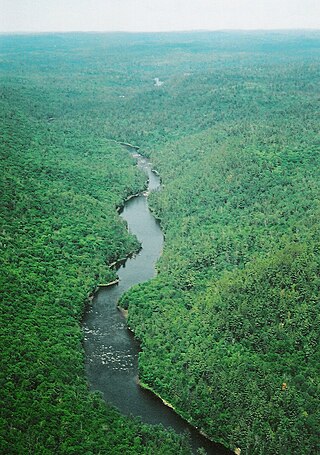
The Dumoine River is a river in western Quebec with its source in Machin Lake near La Vérendrye Wildlife Reserve. From Dumoine Lake, the river flows almost due south off the Canadian Shield and empties into the Ottawa River, just west of Rapides-des-Joachims, Quebec, or Rolphton, Ontario. The river is 129 kilometres (80 mi) long and drains a watershed of 5,380 square kilometres (2,080 sq mi). This relatively short river compared to its drainage area indicates that the Dumoine has a strong current and many steep-gradient rapids.

The Pontiac Pacific Junction Railway Company (PPJR) is a historic Canadian railway that operated in the upper Ottawa River valley in western Quebec and northeastern Ontario, Canada.
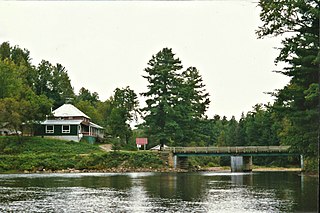
The Noire River is a river in western Quebec, Canada. It runs in a south-eastern direction into the Ottawa River at Waltham, Quebec. It is named after the dark colour of its water.

The Coulonge River is a predominantly wilderness river in western Quebec, Canada.
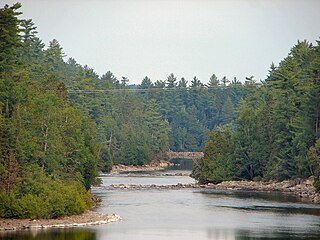
The Kipawa River is a short river in western Quebec, Canada. It is mostly an undeveloped river but the larger lakes have dams, fishing camps, and cottages on their shores. The communities of Kipawa and Laniel are located on Lake Kipawa. Also much logging takes place within its watershed basin, which is consequently crisscrossed by many bush roads. Route 101 crosses the river at Laniel.
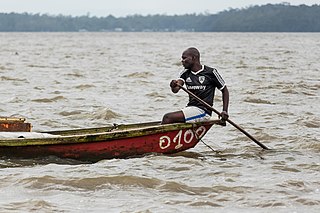
Paddling, in regard to waterborne transport, is the act of propelling a human-powered watercraft using at least one hand-held paddle. The paddle, which consists of one or two blades joined to a shaft, is also used to steer the vessel via generating a difference in propulsion between the two sides of the watercraft. The paddle is not connected to the boat, unlike in rowing where the oar is attached to the boat.

Portage-du-Fort is a village municipality in the Pontiac Regional County Municipality in the southwest corner of the Outaouais region of Quebec, Canada. The village lies across the Ottawa River from Chenaux, Ontario and Horton, Ontario.

Waltham, also known as Waltham Station is a village and municipality in the Outaouais region, Quebec, Canada, part of the Pontiac Regional County Municipality. It is located at the mouth of the Noire River, along the north shore of the Ottawa River at Allumette Island.

L'Île-du-Grand-Calumet is a municipality in the Outaouais region, part of the Pontiac Regional County Municipality, Quebec, Canada. The municipality consists primarily of Calumet Island, but also includes Lafontaine Island, French Island, Green Island, and numerous minor surrounding islets, all in the Ottawa River, approximately two kilometres from Campbell's Bay, two kilometres from Bryson.

Cycloparc PPJ is a rail trail located in the Pontiac Regional County Municipality in Quebec, Canada.

The Coulonge Chutes is a non-profit recreation park and historical exhibition area operating in Mansfield-et-Pontefract, in the Pontiac Regional County Municipality of western Quebec, Canada. Its main attraction is the 42 meters (138 ft) high Grandes Chutes waterfall of the Coulonge River and 100 meters (330 ft) long cement log slide.

Bristol is a municipality in the Ottawa Valley, on the Quebec side in the Outaouais region, part of the Pontiac Regional County Municipality, Quebec, Canada. It is located on the north shore of Lac des Chats across from Arnprior, Ontario.

The Dickerson Whitewater Course, on the Potomac River near Dickerson, Maryland, was built for use by canoe and kayak paddlers training for the 1992 Olympic Games in Spain. It was the first pump-powered artificial whitewater course built in North America, and is still the only one anywhere with heated water. It remains an active training center for whitewater slalom racing, swiftwater rescue training, and other whitewater activities.





















